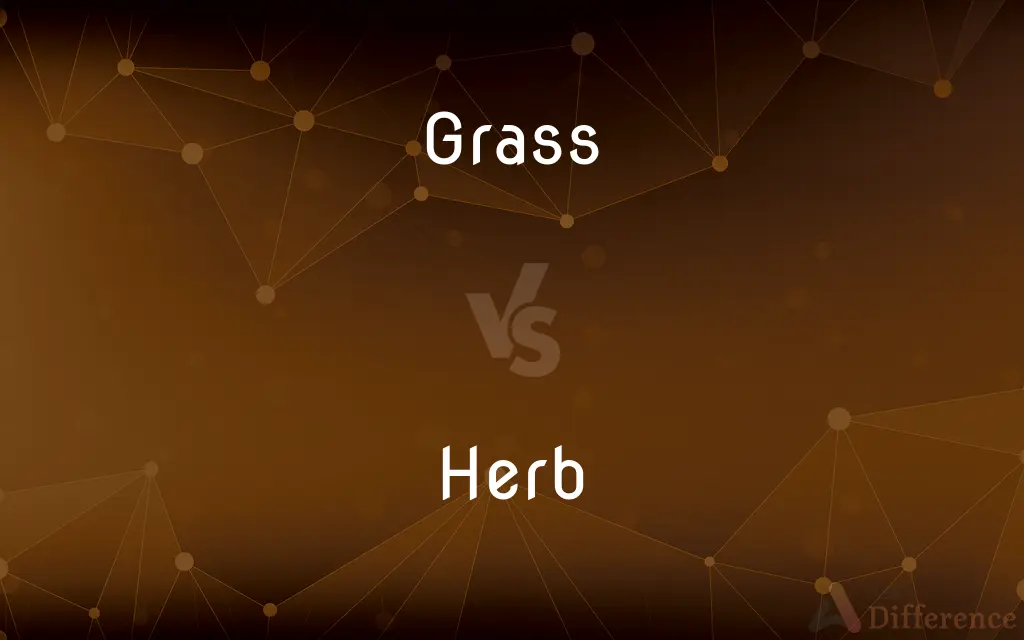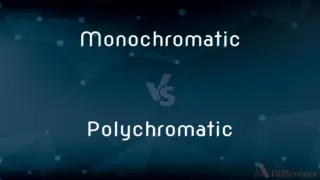Grass vs. Herb — What's the Difference?
By Tayyaba Rehman — Updated on October 11, 2023
Grass refers to plants with narrow green leaves that cover the ground, while Herb describes plants used for food, medicine, or fragrance.

Difference Between Grass and Herb
Table of Contents
ADVERTISEMENT
Key Differences
Grass and Herb are terms commonly used to describe different types of plants. Grass generally refers to the green plants we see covering lawns and fields. They are monocotyledonous, meaning they have a single embryonic leaf, and are a part of the Poaceae family. Herbs, however, encompass a broad range of plants that can be used for culinary, medicinal, or aromatic purposes.
While Grass usually grows close to the ground and forms a mat-like appearance, Herbs can take on various forms. Some Herbs grow tall, while others remain short; some are woody, while others are not. The commonality among Herbs is their use for flavor, scent, or therapeutic benefits. On the other hand, Grasses are largely ornamental or functional, playing a role in preventing soil erosion, acting as fodder for animals, or as recreational surfaces.
Another distinction lies in their life cycles. Grasses typically have a perennial life cycle, meaning they live for more than two years. Some Herbs are also perennial, but others might be annual (lasting one year) or biennial (lasting two years). When considering the nutritional aspects, Grass is packed with cellulose and is a staple for many herbivores. In contrast, many Herbs are rich in essential oils, vitamins, and antioxidants, making them valuable additions to human diets.
From a cultural perspective, both Grass and Herb have deep-rooted significance. Grasslands, comprising primarily of Grass, cover about one-quarter of the Earth's land and play a crucial role in ecosystems. Herbs, given their diverse uses, have been integral to human civilization, playing roles in medicine, cuisine, and religious rituals.
Comparison Chart
Definition
Green plants covering ground
Plants used for culinary, medicinal, or aromatic purposes
ADVERTISEMENT
Family
Poaceae
Various families
Growth Form
Usually forms a mat-like surface
Varies; can be tall, short, woody, or non-woody
Common Uses
Ornamental, prevent soil erosion, animal fodder
Culinary, medicinal, aromatic
Lifecycle
Typically perennial
Can be annual, biennial, or perennial
Compare with Definitions
Grass
Green plants with jointed stems that cover the ground.
The Grass in the park was lush and green.
Herb
A person's natural power or capacity.
He acted with all the vigor of his Herb.
Grass
Fodder for herbivorous animals.
The cows grazed on the fresh Grass.
Herb
A plant used for food, medicine, or scent.
Basil is a popular Herb used in many dishes.
Grass
To inform on someone or betray a secret.
He decided to Grass on his accomplice to the authorities.
Herb
Non-woody plants that die down at the end of the growing season.
The Herb garden was full of rosemary and thyme.
Grass
A member of the grass family.
Herb
Short for "herbal tea" or an infusion of plant leaves.
I love a warm cup of Herb in the evening.
Grass
The members of the grass family considered as a group.
Herb
In general use, herbs are a widely distributed and widespread group of plants with savory or aromatic properties that are used for flavoring and garnishing food, for medicinal purposes, or for fragrances; excluding vegetables and other plants consumed for macronutrients. Culinary use typically distinguishes herbs from spices.
Grass
Any of various plants having slender leaves similar to those of a grass.
Herb
A plant whose stem does not produce woody, persistent tissue and generally dies back at the end of each growing season.
Grass
Ground, as on a lawn, that is covered with grass or similar plants.
Herb
Any of various often aromatic plants used especially in medicine or as seasoning.
Grass
Grazing land; pasture.
Herb
(Slang) Marijuana.
Grass
(Slang) Marijuana.
Herb
(countable) Any green, leafy plant, or parts thereof, used to flavour or season food.
Grass
(Electronics) Small variations in amplitude of an oscilloscope display caused by electrical noise.
Herb
(countable) A plant whose roots, leaves or seeds, etc. are used in medicine.
If any medicinal herbs used by witches were supposedly evil, then how come people from at least the past benefited from the healing properties of such herbs?
Grass
Chiefly British Slang An informer.
Herb
Cannabis.
Grass
To cover with grass.
Herb
A plant whose stem is not woody and does not persist beyond each growing season
Grass
To grow grass on.
Herb
Grass; herbage.
Grass
To feed (livestock) with grass.
Herb
A lame or uncool person.
Grass
To become covered with grass.
Herb
A plant whose stem does not become woody and permanent, but dies, at least down to the ground, after flowering.
Grass
To graze.
Herb
Grass; herbage.
And flocksGrazing the tender herb.
Grass
Any plant of the family Poaceae, characterized by leaves that arise from nodes in the stem and leaf bases that wrap around the stem, especially those grown as ground cover rather than for grain.
Herb
A plant lacking a permanent woody stem; many are flowering garden plants or potherbs; some having medicinal properties; some are pests
Grass
(countable) Various plants not in family Poaceae that resemble grasses.
Herb
Aromatic potherb used in cookery for its savory qualities
Grass
(uncountable) A lawn.
Herb
Informally used to describe a naive or easily deceived person.
Don't be such an Herb; you know that's a scam.
Grass
Marijuana.
Grass
An informer, police informer; one who betrays a group (of criminals, etc) to the authorities.
What just happened must remain secret. Don't be a grass.
Grass
Sharp, closely spaced discontinuities in the trace of a cathode-ray tube, produced by random interference.
Grass
Noise on an A-scope or similar type of radar display.
Grass
The season of fresh grass; spring or summer.
Grass
That which is transitory.
Grass
Asparagus; "sparrowgrass".
Grass
(mining) The surface of a mine.
Grass
(transitive) To lay out on the grass; to knock down (an opponent etc.).
Grass
To act as a grass or informer, to betray; to report on (criminals etc) to the authorities.
Thesaurus:rat out
Grass
(transitive) To cover with grass or with turf.
Grass
(transitive) To feed with grass.
Grass
(transitive) To expose, as flax, on the grass for bleaching, etc.
Grass
(transitive) To bring to the grass or ground; to land.
Grass
Popularly: Herbage; the plants which constitute the food of cattle and other beasts; pasture.
Grass
An endogenous plant having simple leaves, a stem generally jointed and tubular, the husks or glumes in pairs, and the seed single.
Grass
The season of fresh grass; spring.
Two years old next grass.
Grass
Metaphorically used for what is transitory.
Surely the people is grass.
Grass
Marijuana.
Grass
To cover with grass or with turf.
Grass
To expose, as flax, on the grass for bleaching, etc.
Grass
To bring to the grass or ground; to land; as, to grass a fish.
Grass
To produce grass.
Grass
Narrow-leaved green herbage: grown as lawns; used as pasture for grazing animals; cut and dried as hay
Grass
German writer of novels and poetry and plays (born 1927)
Grass
Animal food for browsing or grazing
Grass
Street names for marijuana
Grass
Shoot down, of birds
Grass
Cover with grass;
The owners decided to grass their property
Grass
Spread out clothes on the grass to let it dry and bleach
Grass
Cover with grass
Grass
Feed with grass
Grass
Give away information about somebody;
He told on his classmate who had cheated on the exam
Grass
A surface covered with grassed areas, like a lawn.
The children played on the Grass.
Grass
Informal term for marijuana.
The officer found some Grass in the suspect's car.
Common Curiosities
How do Grass and Herb differ in growth forms?
Grass usually grows in a mat-like form, while Herbs can vary in height and may or may not be woody.
Is bamboo a type of Grass or Herb?
Bamboo is actually a type of Grass.
Why is Grass often used on sports fields?
Grass provides a cushioned, even surface that's safe for play and lessens injury risk.
What role does Grass play in ecosystems?
Grass helps prevent soil erosion, offers a habitat for animals, and aids in carbon dioxide absorption.
Which is more diverse in terms of species: Grass or Herb?
Herbs, as they can come from various plant families, are more diverse in terms of species than Grasses which belong to the Poaceae family.
How do Grass and Herb differ in lifecycles?
Grass is typically perennial, while Herbs can be annual, biennial, or perennial.
Can an Herb be a type of Grass?
No, while both are plants, an Herb isn't a Grass, but it could be herbaceous.
What’s the difference between a herbaceous plant and an Herb?
A herbaceous plant has non-woody stems, while an Herb is specifically used for culinary, medicinal, or aromatic purposes.
Why are Herbs often added to dishes?
Herbs add flavor, aroma, and often have nutritional or medicinal properties.
Can all types of Grass be consumed by humans?
No, not all Grass types are edible for humans, although some like wheat and barley are.
Are spices and Herbs the same?
No, spices usually come from the seeds, bark, or roots of plants, while Herbs often refer to the leaves.
Are all Herbs safe to consume?
No, while many Herbs are used for culinary or medicinal purposes, some can be toxic if ingested.
How do you distinguish between a Grass and an Herb in a garden?
Grass typically has narrow, blade-like leaves and grows close to the ground, while Herbs can vary in form but are usually recognized by their aromatic leaves.
Why do some people have Grass allergies?
People with Grass allergies react to the pollen released by Grass, especially during its flowering season.
Share Your Discovery

Previous Comparison
Monochromatic vs. Polychromatic
Next Comparison
Creditor vs. LenderAuthor Spotlight
Written by
Tayyaba RehmanTayyaba Rehman is a distinguished writer, currently serving as a primary contributor to askdifference.com. As a researcher in semantics and etymology, Tayyaba's passion for the complexity of languages and their distinctions has found a perfect home on the platform. Tayyaba delves into the intricacies of language, distinguishing between commonly confused words and phrases, thereby providing clarity for readers worldwide.















































